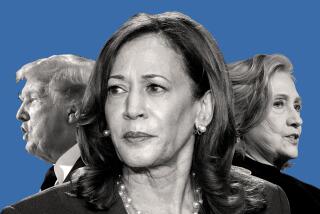Analysis:: Kavanaugh’s angry testimony may save his nomination, but undercut his claims of being an impartial jurist

- Share via
Reporting from Washington — Judge Brett Kavanaugh’s raw, combative defense against a sexual assault allegation from decades ago may have saved his embattled nomination, but his angry, partisan words last week also may have damaged his ability to be seen as a fair justice on the nation’s highest court.
Kavanaugh said he wrote his statement, which he delivered Thursday before the Senate Judiciary Committee, entirely on his own.
And unlike much of the nation, he said he did not watch the preceding, riveting testimony of Christine Blasey Ford, the California psychology professor who told the senators she was “100%” certain a teenage Kavanaugh had drunkenly attacked her when they were high school students in suburban Maryland in the early 1980s.
Determined to clear his name, he did not just argue that Ford, whom he says he had barely known, had mistakenly identified him as the attacker she feared would rape her, or suffocate her by muffling her cries. Rather, he portrayed the accusation as a politically motivated attack by vengeful Democrats, arising from “the frenzy on the left” to “blow me up and take me down.”
At week’s end, Kavanaugh’s confirmation remained in some doubt. The Republican-led Senate bowed to pressure and postponed a confirmation vote for a week while the FBI conducts a limited investigation of the allegations against him by Ford and two other women.
Should he be confirmed, however, at a minimum his nationally televised remarks are likely to linger in Americans’ memories, further undercutting for many the notion that the high court’s decisions reflect a fair, impartial reading of the Constitution, history and precedent — and not the nine justices’ political leanings. In particular, Kavanaugh’s judicial temperament has been called into question.
“There will be damage to the court and its reputation,” said Erwin Chemerinsky, dean of the UC Berkeley School of Law.
This episode, he noted, follows the Bush vs. Gore ruling in 2000, which settled the presidential election in Republican George W. Bush’s favor, as well as Senate Republicans’ 2016 action blocking even a hearing for Merrick Garland, President Obama’s Supreme Court nominee, to hold the seat open until Donald Trump took office.
“I have the sense that all of this will have given the Republicans control of the court that they have wanted for decades, but they have greatly damaged the institution in the process,” Chemerinsky said.
Legal observers said Kavanaugh had all but refuted his earlier message to senators during his first, days-long appearance before the Judiciary Committee earlier this month, when he emphasized that he had been an independent judge on the D.C. Circuit Court of Appeals, and did so in mostly calm, measured tones.
“The Supreme Court must never be viewed as a partisan institution,” he said then. “The justices on the Supreme Court do not sit on opposite sides of an aisle. They do not caucus in separate rooms. If confirmed to the court, I would be part of a team of nine, committed to deciding cases according to the Constitution and laws of the United States.”
On Thursday, Kavanaugh telegraphed a far different message, and loudly, in tones that were by turns angry, mocking and scornful of the Democratic senators arrayed to his right.
This “has been a calculated and orchestrated political hit, fueled with apparent pent-up anger about President Trump and the 2016 election, fear that has been unfairly stoked about my judicial record, revenge on behalf of the Clintons and millions of dollars in money from outside left-wing opposition groups,” he said.
Pointing to the Democrats, he angrily alleged, “Some of you were lying in wait,” ready to reveal Ford’s secret allegation just as the committee and the Senate were about to confirm him to a lifetime seat on the Supreme Court.
“My family and my name have been totally and permanently destroyed by vicious and false additional accusations,” he said, referring to the allegations from two other women who had come forward once Ford went public with her allegation two weeks ago.
Perhaps not surprisingly, given that Kavanaugh had reason to fear that the president could pressure him to withdraw, the judge’s attack on the Democrats echoed what Trump had said two days earlier.
Speaking in New York, the president had described the sexual assault allegations against his Supreme Court nominee as a “big fat con job” orchestrated by the Democrats. “They’re actually con artists,” he said.
After Kavanaugh spoke at Thursday’s committee hearing, similarly taking the fight to his Democratic critics, the president reaffirmed his support on Twitter: “Judge Kavanaugh showed America exactly why I nominated him. His testimony was powerful, honest, and riveting. Democrats’ search and destroy strategy is disgraceful and this process has been a total sham.”
Liberal critics, however, said Kavanaugh showed he did not have the proper judicial temperament for the job.
“I thought his partisan remarks and his angry, unprofessional tone were not befitting the position he seeks,” said Jill Dash, a vice president of the American Constitution Society, a progressive legal group. “Putting someone on the court with a seething partisan vindictiveness will do real damage to the institution. It is not how we expect a Supreme Court justice, or any judge, to comport himself.”
Sen. Dianne Feinstein of California, the senior Democrat on the Judiciary Committee, who was criticized for holding Ford’s accusation in confidence for weeks at the accuser’s request, said Friday that she was stunned that Kavanaugh had joined in the Republicans’ political attack.
“Candidly, in my 25 years on this committee, I have never seen a nominee for any position behave in that manner,” she said.
He “yelled at Democrats,” she said, and his suggestion that Ford’s allegation had something to do with Democrats avenging the Clintons was “unbelievable.”
“This was not someone who reflected an impartial temperament or the fairness and evenhandedness one would see in a judge. This was someone who was angry and belligerent,” Feinstein said. “In stark contrast,” she added, it was Ford who “demonstrated a balanced temperament.”
Kavanaugh’s defenders said the judge was rightly angry at what they, too, characterized as false and unfair accusations that were designed to destroy his reputation.
“Both witnesses did a good job. I thought Brett Kavanaugh was compelling. He was angry because he was defending his honor,” said John Malcolm, a constitutional expert with the conservative Heritage Foundation.
“You spend a lifetime building up a reputation,” he added. “How could you not be angry to see your reputation destroyed with unfair, last-minute allegations that smelled of a partisan hit job?”
If Kavanaugh is confirmed, Malcolm said, he will go to the high court “with a cloud hanging over him,” but one that will not prevent him from being a strong and fair justice.
Malcolm pointed to the experience of Justice Clarence Thomas, who was confirmed nearly 27 years ago after a similarly searing, nationally televised Judiciary Committee hearing on the allegations of a former assistant, Anita Hill, that he’d sexually harassed her.
“Yes, he will have this hanging over him, just the way Justice Thomas has had it hanging over his head for 25 years. But I’m confident it will not affect him as a justice. He will not become a partisan hack. He is a fair, principled and independent judge, and that’s exactly the kind of justice he will be.”
More stories from David G. Savage »
Twitter: DavidGSavage
More to Read
Get the L.A. Times Politics newsletter
Deeply reported insights into legislation, politics and policy from Sacramento, Washington and beyond. In your inbox three times per week.
You may occasionally receive promotional content from the Los Angeles Times.











